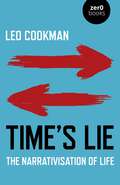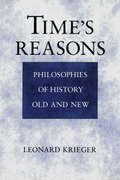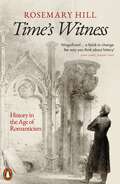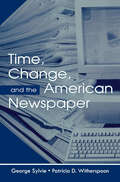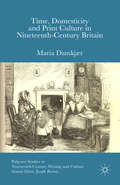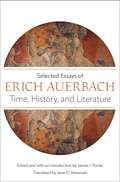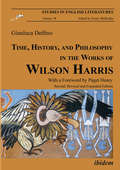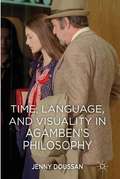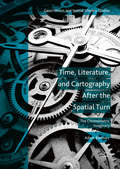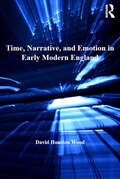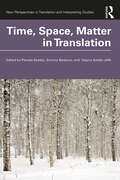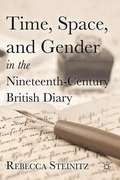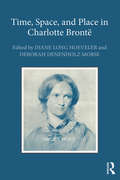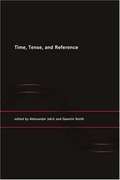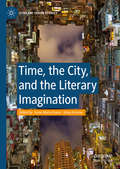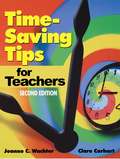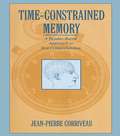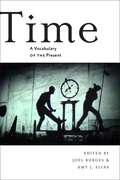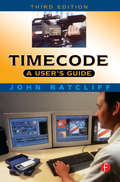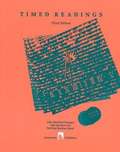- Table View
- List View
Time's Lie: The Narrativisation of Life
by Leo CookmanWhy are facts and statistics disparaged and dismissed, now more than ever? Why do people trust fake news? If we have 'had enough of experts' who should we listen to? Rather than the possible collapse of modern society, could this be an opportunity to look at not just society but our own lives in a different way? Whoever controls the narrative is the one who is in control. Time&’s Lie analyses the history, the science and the philosophy behind the creation of linear stories, or &‘Narrativisation&’ as this book dubs it.
Time's Reasons: Philosophies of History Old and New
by Leonard KriegerThis original work caps years of thought by Leonard Krieger about the crisis of the discipline of history. His mission is to restore history's autonomy while attacking the sources of its erosion in various "new histories," which borrow their principles and methods from disciplines outside of history. Krieger justifies the discipline through an analysis of the foundations on which various generations of historians have tried to establish the coherence of their subject matter and of the convergence of historical patterns. The heart of Krieger's narrative is an insightful analysis of theories of history from the classical period to the present, with a principal focus on the modern period. Krieger's exposition covers such figures as Ranke, Hegel, Comte, Marx, Acton, Troeltsch, Spengler, Braudel, and Foucault, among others, and his discussion involves him in subtle distinctions among terms such as historism, historicism, and historicity. He points to the impact on history of academic political radicalism and its results: the new social history. Krieger argues for the autonomy of historical principles and methods while tracing the importation in the modern period of external principles for historical coherence. Time's Reasons is a profound attempt to rejuvenate and restore integrity to the discipline of history by one of the leading masters of nineteenth- and twentieth-century historiography. As such, it will be required reading for all historiographers and intellectual historians of the modern period.
Time's Witness: History in the Age of Romanticism
by Rosemary HillFrom the Wolfson Prize-winning author of God's Architect: Pugin and the Building of Romantic BritainBetween the fall of the Bastille in 1789 and the opening of the Great Exhibition in 1851, history changed. The grand narratives of the Enlightenment, concerned with kings and statesmen, gave way to a new interest in the lives of ordinary people. Oral history, costume history, the history of food and furniture, of Gothic architecture, theatre and much else were explored as never before. Antiquarianism, the study of the material remains of the past, was not new, but now hundreds of men - and some women - became antiquaries and set about rediscovering their national history, in Britain, France and Germany.The Romantic age valued facts, but it also valued imagination and it brought both to the study of history. Among its achievements were the preservation of the Bayeux Tapestry, the analysis and dating of Gothic architecture, and the first publication of Beowulf. It dispelled old myths, and gave us new ones: Shakespeare's birthplace, clan tartans and the arrow in Harold's eye are among their legacies. From scholars to imposters the dozen or so antiquaries at the heart of this book show us history in the making.
Time, Change, and the American Newspaper (Routledge Communication Series)
by George Sylvie Patricia D. WitherspoonTime, Change, and the American Newspaper focuses on newspapers as organizations, examining the role of change in the newspaper industry and providing a model from which to view and respond to change. Authors George Sylvie and Patricia D. Witherspoon discuss environmental and organizational influences on contemporary newspapers, and they analyze newspapers within the larger context of all organizations. This more general perspective provides insights into the nature of change, the change process, the rationale for organizational changes, resistance to such changes, and initiation and implementation strategies. In its examination of change, this volume explores the causes of newspaper change, how newspaper change takes shape, and when change does not work. This consideration sets the stage for detailed case studies examining the roles of new technology, product, and people as change agents in newspapers. The discussion concludes with the impact of change--or lack of it--on the contemporary newspaper industry and the subsequent impact of newspaper change on society. Sylvie and Witherspoon propose future directions of change and of newspaper decision-making processes pertaining to change, and they offer suggestions for changes in newspaper structures and thought processes. Providing a sound, theoretically-based approach to the topic of change and American newspapers, this volume is essential reading for educators and students in journalism, media/newsroom management, media economics, organizational behavior/communication, and related areas. It also provides a wealth of insights and practical knowledge for newspaper publishers, editors, and practicing journalists.
Time, Domesticity and Print Culture in Nineteenth-Century Britain (Palgrave Studies in Nineteenth-Century Writing and Culture)
by M. DamkjærThis innovative study shows that nineteenth-century texts gave domesticity not just a spatial but also a temporal dimension. Novels by Dickens and Gaskell, as well as periodicals, cookery books and albums, all showed domesticity as a process. Damkjær argues that texts' material form had a profound influence on their representation of domestic time.
Time, History, and Literature: Selected Essays of Erich Auerbach
by Erich AuerbachImportant essays from one of the giants of literary criticism, including a dozen published here in English for the first timeErich Auerbach (1892-1957), best known for his classic literary study Mimesis, is celebrated today as a founder of comparative literature, a forerunner of secular criticism, and a prophet of global literary studies. Yet the true depth of Auerbach's thinking and writing remains unplumbed. Time, History, and Literature presents a wide selection of Auerbach's essays, many of which are little known outside the German-speaking world. Of the twenty essays culled for this volume from the full length of his career, twelve have never appeared in English before, and one is being published for the first time.Foregrounded in this major new collection are Auerbach's complex relationship to the Judaeo-Christian tradition, his philosophy of time and history, and his theory of human ethics and responsible action. Auerbach effectively charts out the difficult discovery, in the wake of Christianity, of the sensuous, the earthly, and the human and social worlds. A number of the essays reflect Auerbach's responses to an increasingly hostile National Socialist environment. These writings offer a challenging model of intellectual engagement, one that remains as compelling today as it was in Auerbach's own time.
Time, History, and Philosophy in the Works of Wilson Harris
by Gianluca DelfinoGianluca Delfino's study of one of the Caribbean's most controversial authors paves the way for looking at Wilson Harris's body of work in a new light. Harris's imaginative approach to reality is discussed in relation to the categories of history and time with reference to several novels, with a special focus on The Infinite Rehearsal, Jonestown, and The Dark Jester, spanning more than forty years of his vast literary production. Delfino's analysis, encompassing critical perspectives ranging from African philosophy to Jungian readings through historiography and anthropology, demonstrates that Harris's works as a whole show a remarkable unity of thought rooted in their author's complex imagination. As a result, the cross-cultural quality of Harris's thought emerges as a healing outcome of the traumatic colonial encounter, bringing together elements of Amerindian, African, and European origin in an ongoing dialogue with time, nature, and the psyche.
Time, History, and Philosophy in the Works of Wilson Harris (Studies in English Literatures #18)
by Gianluca DelfinoGianluca Delfino's encounter with one of the Caribbean's most controversial authors illuminates Wilson Harris's imaginative approach to history and time. Delfino references several novels, with a special focus on The Infinite Rehearsal (1987), Jonestown (1996), and The Dark Jester (2001). His analysis encompasses critical perspectives from African philosophy to Jungian readings, refracted through historiography and anthropology, demonstrating the remarkable unity that binds four decades of Harris's work. As a result, the cross-cultural quality of Harris's thought emerges as a healing outcome of the traumatic colonial encounter, bringing together elements of Amerindian, African, and European origin in an ongoing dialogue with time, nature, and the psyche.
Time, Language, and Visuality in Agamben’s Philosophy
by Jenny DoussanGiorgio Agamben, a philosopher both celebrated and reviled, is among the prominent voices in contemporary Italian thought today. His work, which touches upon fields as diverse as aesthetics and biopolitics, is often understood within a framework of Aristotelian potentiality. With this incisive critique, Doussan identifies a different tendency in the philosopher's work, an engagement with the problem of time that is inextricably bound up with language and visuality. Founded in his early writings on metaphysics and continuing to his present occupation with inoperativity, Time, Language and Visuality in Agamben's Philosophy forges an original path through Agamben's extensive commentary on the linguistic and the visual to illuminate the recurrent temporal theme of capture and evasion the cat-and-mouse game that bears the foundational violence of not just representation but concept-formation itself. In the process, Doussan both reveals its limit and establishes a ground for future engagements. "
Time, Literature, and Cartography After the Spatial Turn
by Adam BarrowsTime, Literature and Cartography after the Spatial Turn argues that the spatial turn in literary studies has the unexplored potential to reinvigorate the ways in which we understand time in literature. Drawing on new readings of time in a range of literary narratives, including Vladimir Nabokov's Ada and James Joyce's Finnegans Wake, Adam Barrows explores literature's ability to cartographically represent the dense and tangled rhythmic processes that constitute lived spaces. Applying the insights of ecological resilience studies, as well as Henri Lefebvre's late work on rhythm to literary representations of time, this book offers a sustained examination of literature's "chronometric imaginary": its capacity to map the temporal relationships between the human and the non-human, the local and the global.
Time, Narrative, and Emotion in Early Modern England (Literary And Scientific Cultures Of Early Modernity Ser.)
by David Houston WoodExploiting a link between early modern concepts of the medical and the literary, David Houston Wood suggests that the recent critical attention to the gendered, classed, and raced elements of the embodied early modern subject has been hampered by its failure to acknowledge the role time and temporality play within the scope of these admittedly crucial concerns. Wood examines the ways that depictions of time expressed in early modern medical texts reveal themselves in contemporary literary works, demonstrating that the early modern recognition of the self as a palpably volatile entity, viewed within the tenets of contemporary medical treatises, facilitated the realistic portrayal of literary characters and served as a structuring principle for narrative experimentation. The study centers on four canonical, early modern texts notorious among scholars for their structural- that is, narrative, or temporal- difficulties. Wood displays the cogency of such analysis by working across a range of generic boundaries: from the prose romance of Philip Sidney's Arcadia, to the staged plays of William Shakespeare's Othello and The Winter's Tale, to John Milton's stubborn reliance upon humoral theory in shaping his brief epic (or closet drama), Samson Agonistes. As well as adding a new dimension to the study of authors and texts that remain central to early modern English literary culture, the author proposes a new method for analyzing the conjunction of character emotion and narrative structure that will serve as a model for future scholarship in the areas of historicist, formalist, and critical temporal studies.
Time, Space, Matter in Translation (New Perspectives in Translation and Interpreting Studies)
by Simona Bertacco Pamela Beattie Tatjana Soldat-JaffeTime, Space, Matter in Translation considers time, space, and materiality as legitimate habitats of translation. By offering a linked series of interdisciplinary case studies that show translation in action beyond languages and texts, this book provides a capacious and innovative understanding of what translation is, what it does, how, and where. The volume uses translation as a means through which to interrogate processes of knowledge transfer and creation, interpretation and reading, communication and relationship building—but it does so in ways that refuse to privilege one discipline over another, denying any one of them an entitled perspective. The result is a book that is grounded in the disciplines of the authors and simultaneously groundbreaking in how its contributors incorporate translation studies into their work. This is key reading for students in comparative literature—and in the humanities at large—and for scholars interested in seeing how expanding intellectual conversations can develop beyond traditional questions and methods.
Time, Space, and Gender in the Nineteenth-Century British Diary
by Rebecca SteinitzThrough close examinations of diaries, diary publication, and diaries in fiction, this book explores how the diary's construction of time and space made it an invaluable and effective vehicle for the dominant discourses of the period; it also explains how the genre evolved into the feminine, emotive, private form we continue to privilege today.
Time, Space, and Motion in the Age of Shakespeare
by Angus FletcherTheirs was a world of exploration and experimentation, of movement and growth--and in this, the thinkers of the Renaissance, poets and scientists alike, followed their countrymen into uncharted territory and unthought space. A book that takes us to the very heart of the enterprise of the Renaissance, this closely focused but far-reaching work by the distinguished scholar Angus Fletcher reveals how early modern science and English poetry were in many ways components of one process: discovering and expressing the secrets of motion, whether in the language of mathematics or verse. Throughout his book, Fletcher is concerned with one main crisis of knowledge and perception, and indeed cognition generally: the desire to find a correct theory of motion that could only end with Newton's Laws. Beginning with the achievement of Galileo--which changed the world--Time, Space, and Motion identifies the problem of motion as the central cultural issue of the time, pursued through the poetry of the age, from Marlowe and Shakespeare to Ben Jonson and Milton, negotiated through the limits and the limitless possibilities of language much as it was through the constraints of the physical world.
Time, Space, and Place in Charlotte Brontë
by Deborah Denenholz Morse Diane Long HoevelerOrganized thematically around the themes of time, space, and place, this collection examines Charlotte Brontë in relationship to her own historical context and to her later critical reception, takes up the literal and metaphorical spaces of her literary output, and sheds light on place as both a psychic and geographical phenomenon in her novels and their adaptations. Foregrounding both a historical and a broad cultural approach, the contributors also follow the evolution of Brontë's literary reputation in essays that place her work in conversation with authors such as Samuel Richardson, Walter Scott, and George Sand and offer insights into the cultural and critical contexts that influenced her status as a canonical writer. Taken together, the essays in this volume reflect the resurgence of popular and scholarly interest in Charlotte Brontë and the robust expansion of Brontë studies that is currently under way.
Time, Tense, and Reference
by Aleksandar Jokic Quentin SmithAmong the many branches of philosophy, the philosophy of time and the philosophy of language are more intimately interconnected than most, yet their practitioners have long pursued independent paths. This book helps to bridge the gap between the two groups.
Time, the City, and the Literary Imagination (Literary Urban Studies)
by Anne-Marie Evans Kaley KramerTime, the City, and the Literary Imagination explores the relationship between the constructions and representations of the relationship between time and the city in literature published between the late eighteenth century and the present. This collection offers a new way of reading the literary city by tracing the ways in which the relationship between time and urban space can shape literary narratives and forms. The essays consider the representation of a range of literary cities from across the world and consider how an understanding of time, and time passing, can impact on our understanding of the primary texts. Literature necessarily deals with time, both as a function of storytelling and as an experience of reading. In this volume, the contributions demonstrate how literature about cities brings to the forefront the relationship between individual and communal experience and time.
Time-Saving Tips for Teachers (1-off Ser.)
by Joanne C. Wachter Clare CarhartPerfect for teachers who need help managing their time,Time Saving Tips for Teachers is structured for easy use. Flip through the chapters and apply the ideas that fit immediate needs and style—and includes more than sixty reproducible forms that can be used right away, covering student and parent information, reading and writing coaches, homework, standards for assignments, and supplies, just to name a few. New tips include portfolios, substitute teachers, email, handheld computers, and the Internet!Chapters provide ideas on how to save time without diminishing quality by:Communicating effectively—but brieflyManaging materialsPlanning the week aheadLearning to say "No"Using the Internet to save timeWorking with substitutes and volunteersCreating a filing system that saves timeAvoiding distractionsTreating yourself as a professionalThis guide helps teachers work smarter and enjoy life outside of teaching once again!
Time-constrained Memory: A Reader-based Approach To Text Comprehension
by Jean-Pierre CorriveauThis book tries to answer the question posed by Minsky at the beginning of The Society of Mind: "to explain the mind, we have to show how minds are built from mindless stuff, from parts that are much smaller and simpler than anything we'd considered smart." The author believes that cognition should not be rooted in innate rules and primitives, but rather grounded in human memory. More specifically, he suggests viewing linguistic comprehension as a time-constrained process -- a race for building an interpretation in short term memory. After reviewing existing psychological and computational approaches to text understanding and concluding that they generally rely on self-validating primitives, the author abandons this objectivist and normative approach to meaning and develops a set of requirements for a grounded cognitive architecture. He then goes on to explain how this architecture must avoid all epistemological commitments, be tractable both with respect to space and time, and, most importantly, account for the diachronic and non-deterministic nature of comprehension. In other words, a text may or may not lead to an interpretation for a specific reader, and may be associated with several interpretations over time by one reader. Throughout the remainder of the book, the author demonstrates that rules for all major facets of comprehension -- syntax, reference resolution, quantification, lexical and structural disambiguation, inference and subject matter -- can be expressed in terms of the simple mechanistic computing elements of a massively parallel network modeling memory. These elements, called knowledge units, work in a limited amount of time and have the ability not only to recognize but also to build the structures that make up an interpretation. Designed as a main text for graduate courses, this volume is essential to the fields of cognitive science, artificial intelligence, memory modeling, text understanding, computational linguistics and natural language understanding. Other areas of application are schema-matching, hermeneutics, local connectionism, and text linguistics. With its extensive bibliography, the book is also valuable as supplemental reading for introductory undergraduate courses in cognitive science and computational linguistics.
Time: A Vocabulary of the Present
by Joel Burges Amy J. EliasThe critical condition and historical motivation behind Time Studies The concept of time in the post-millennial age is undergoing a radical rethinking within the humanities. Time: A Vocabulary of the Present newly theorizes our experiences of time in relation to developments in post-1945 cultural theory and arts practices. Wide ranging and theoretically provocative, the volume introduces readers to cutting-edge temporal conceptualizations and investigates what exactly constitutes the scope of time studies.Featuring twenty essays that reveal what we talk about when we talk about time today, especially in the areas of history, measurement, and culture, each essay pairs two keywords to explore the tension and nuances between them, from “past/future” and “anticipation/unexpected” to “extinction/adaptation” and “serial/simultaneous.” Moving beyond the truisms of postmodernism, the collection newly theorizes the meanings of temporality in relationship to aesthetic, cultural, technological, and economic developments in the postwar period. This book thus assumes that time—not space, as the postmoderns had it—is central to the contemporary period, and that through it we can come to terms with what contemporaneity can be for human beings caught up in the historical present. In the end, Time reveals that the present is a cultural matrix in which overlapping temporalities condition and compete for our attention. Thus each pair of terms presents two temporalities, yielding a generative account of the time, or times, in which we live.
Timecode A User's Guide: A user's guide (Music Technology Ser.)
by J. RatcliffRecent radical changes in timecode technology, location shooting and post-production working practices have been brought about by the fragmentation of the television programme making industry and by a dramatic increase in affordable digital transmission and editing equipment and systems.With the expansion of non-traditional television service producers (cable, satellite and video-on-demand) almost anything hoes as far as shooting and editing formats are concerned. Timecode: A User's Guide is an indispensable reference for anyone needing to get to grips with the many aspects of timecode, whether in-house or on location.Taking into account these changes this book has now been brought completely up to date to include:* timecode and DVD, LTC & VITC in HANC packets in the serial digital TV interfaces * timecode in IEEE1395 (Firewire)* timecode and digital video cassettes* new recording formats of DVD, DV mini cassettes and D6 are included* 4:3 scanning for wide-screen films - standards updated* new material to cover new working practices* new appendices to cover the global LF time data transmissions and time data embedded in BBC transmissionsAdvice is also given on avoiding and remedying faults and errors.
Timed Readings: Fifty 400-Word Passages with Questions for Building Reading Speed (Book One) (Third Edition)
by Edward SpargoPrepare your students for timed tests from our largest collection of science, social studies, and literature selections Increase reading stamina Build reading rate and fluency Prepare students for state and national tests Do you have students who simply do not finish the test in the time allotted? Do they move their eyes over the page without remembering what they read? For over 30 years, the Jamestown Timed Readings collection has helped such students increase their reading rate, fluency, and comprehension. The 55 books in the series all have Uniform 400-word passages for easy timing Nonfiction and fiction selections like those found on state and national tests Literal and critical comprehension questions Progress charts for motivation Identical covers within a series so no one is embarrassed Six different series to meet your students' needs Timed Readings Plus in Social Studies, Science, or Mathematics--passages on content area topics like those found on standardized tests Timed Readings in Literature--excerpts from great literature Timed Readings--passages from science, social studies, the humanities, and more Timed Readings Plus--nonfiction passages followed by related fiction
Timed Readings: Fifty 400-Word Passages with Questions for Building Reading Speed (Book Ten) (Third Edition)
by Edward SpargoDo your students fail to even finish a timed test? Do they read word by word? Do they simply move their eyes over the page, never remembering what they read? If you suspect that students' test scores are being confounded by any of these traits, or if you have students who need to process greater amounts of information, the Timed Readings books can help. For over thirty years, Jamestown has been helping students increase their reading rate and fluency while maintaining comprehension. Timed Readings is the original series of timed reading books; 400-word nonfiction timed passages in science, social studies, the humanities, and more.
Timeless Voices Timeless Themes: World Masterpieces
by Prentice HallWorld Masterpieces features classic literature dating back nearly 5000 years. The earliest writings of Confucius along with literature from Sumerians and Persians capture themes from the dawn of literary civilization.Works from Japan, Zaire, France, and dozens of other countries show how themes of human life recur in distinct and diverse cultures. Each unit opens with historical, geographical, and cultural background. Special Cross Currents features link ideas from the past to contemporary events relevant to today's students.
